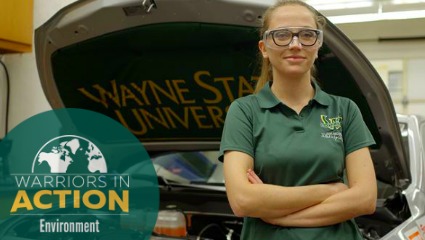
Michigan has a proud industrial legacy. Go a few miles from Wayne State's Midtown campus and you will see evidence of a time when Detroit was the epicenter of manufacturing. In all directions, you'll encounter old factories that were dedicated to producing automobiles, then airplanes and then automobiles again. It's a landscape that you will find in aging urban centers across the country.
What isn't so easy to see, however, is the effect this legacy has on a city's residents - consequences to their health, finances and lifestyle. As Michigan's only urban, public research university, Wayne State is uniquely positioned to address the environmental impact of the state's industrial legacy, leveraging the resources of its 13 schools and colleges to create interdisciplinary research teams to tackle the effects of soil and water contamination and air pollution. Perhaps more importantly, Wayne State scientists are taking proactive steps to ensure a better environment for future generations.
Shawn McElmurry, an environmental engineer and assistant professor at Wayne State, is championing research that will help create a sustainable environmental future for Detroit. Working with colleagues from the School of Medicine, McElmurry found that Detroit children have higher blood lead levels during the summer because they are exposed to the lead left behind in the city's soil.
The study is one of many important steps that cities like Detroit can begin taking to help mitigate the effect of environmental issues left behind by their industrial legacy.
"Cities with a history of a booming manufacturing industry can't ignore what chemicals have gone into the ground," commented McElmurry. "The more we understand how contaminants like lead are affecting populations, the better we can assess how to create solutions."
McElmurry has worked to promote and advocate a few simple steps to help neighborhoods and cities deal with contaminated lead soil.
While McElmurry is working to understand the effects of lead in the soil, Sylvie Naar-King, a professor in WSU's Department of Pediatrics and the Pediatric Prevention Research Center, is studying the city's stunning asthma rate, which has been tied to air quality. Detroit has the highest asthma rate in young children among America's 18 largest cities. Naar-King was awarded a $3.6 million grant to help Detroit's children better manage their asthma and create better outcomes.
Reducing the environmental impact of automobile emissions will play an important role in improving the air quality in cities like Detroit. As President Obama's 2025 deadline for 54.5 mpg fuel efficiency standards draws closer, Wayne State was recently selected by the U.S. Department of Energy (DOE) and General Motors (GM) to prepare students who will meet the growing demand for engineers specializing in energy efficient vehicle design over the next decade and beyond.
The initiative is part of the EcoCAR3 program, which was developed by DOE and GM to educate the next generation of automotive engineers while creating new ways to reduce the environmental impact of automobiles without sacrificing consumer acceptability. Wayne State is the only university in Michigan to be selected for the four-year program, and one of only 16 in North America.
Jerry Ku, an associate professor of mechanical engineering at Wayne State and director of the university's electric-drive vehicle engineering graduate program - which was, when developed, the first of its kind in the nation - is leading the university's EcoCAR3 team.
"Being selected by the Department of Energy and GM to not only lead education, but also innovation in the areas of fuel efficiency and emissions will help position Wayne State's reputation as a leader in a more environmentally responsible future for the automobile industry," said Ku.
Wayne State has made it part of its mission to positively impact local and global communities. With experts like McElmurry, Naar-King and Ku collaborating to lead Wayne State's environmental research, the university is uniquely positioned to do just that.
Environmental impact
From water and urban farming to sustainability, green technologies and much more, Wayne State's location in the heart of Detroit provides students with endless opportunities to make a substantial difference in the city and beyond through interdisciplinary pathways in the arts and sciences, engineering, law, medicine, pharmacy, and business. Read more.
